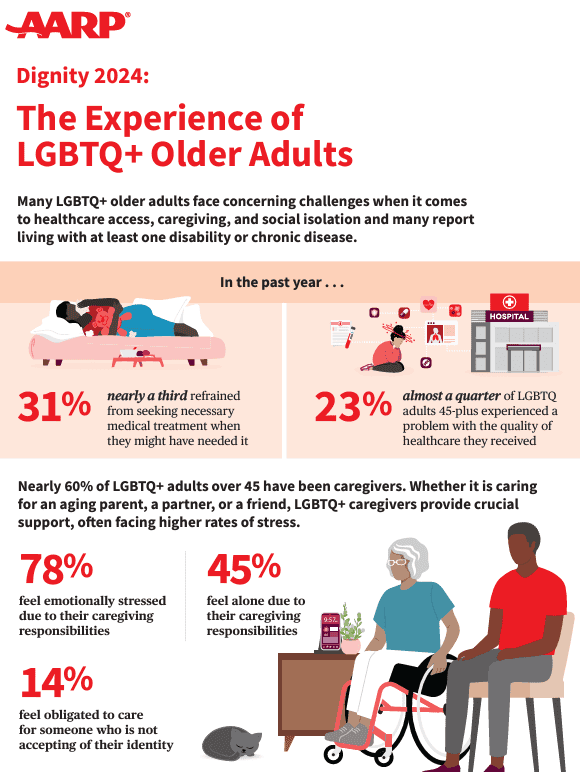Addressing the Unique Challenges of Aging for LGBTQ+ Older Adults: Insights from AARP’s “Dignity 2024” Report
As our population ages, the challenges faced by LGBTQ+ older adults are coming into sharper focus, highlighting the need for targeted support and resources. AARP’s new survey, “Dignity 2024: The Experience of LGBTQ+ Older Adults,” sheds light on these issues, revealing critical concerns and providing recommendations for improving the lives of LGBTQ+ individuals as they age.
Key Findings: Social Support and Health Concerns
One of the most significant findings from the survey is that 78% of LGBTQ+ adults over the age of 45 are worried about having enough support from family and friends as they grow older. This concern is particularly acute given that nearly half (45%) of LGBTQ+ respondents are already living with a chronic condition, disability, or both—a figure that is likely to increase as they age.
The survey also highlights the unique stressors faced by LGBTQ+ caregivers. With 58% of respondents aged 45 and older having served as caregivers at some point, the emotional toll is evident—78% of LGBTQ+ caregivers report feeling stressed. This stress is compounded by the fact that 14% of these caregivers feel obligated to care for someone who may not accept their identity, further straining their mental health and well-being.
In addition, the issue of social isolation remains a significant concern for LGBTQ+ older adults. Almost half of the respondents (45%) expressed a lack of companionship, and even more (48%) reported feeling isolated from others. This isolation is particularly pronounced among LGBTQ+ individuals with disabilities, with 51% of them expressing deep concern about having adequate social support, compared to 33% of those without a disability.
Discrimination in Health Care and Employment
Access to health care is another area where LGBTQ+ older adults face challenges. The report reveals that a significant portion of respondents feel that age discrimination (25%), sexual orientation discrimination (21%), or gender identity discrimination (20%) affect their access to health care. These barriers not only impact the quality of care they receive but also contribute to the stress and anxiety associated with aging in a society that often overlooks their needs.
The fear of discrimination extends beyond health care into the workplace. Among those employed, nearly half (45%) of LGBTQ+ adults aged 45 and over fear age-based discrimination in future employment opportunities. This concern is particularly troubling given that maintaining financial security is a top priority for 94% of respondents.
Economic Disparities
Economic insecurity is another pressing issue for LGBTQ+ older adults, particularly for transgender and nonbinary individuals. The report found that transgender and nonbinary respondents are the least likely among LGBTQ+ groups to have a household income of $75,000 or more (34%), underscoring the financial vulnerabilities faced by this community.

Moving Forward: Recommendations for Support
The “Dignity 2024” report provides several recommendations to address these challenges. Key among them is increasing access to health care and ensuring that providers are equipped with the tools and training necessary to understand and address the unique needs of the LGBTQ+ community. Additionally, fostering a more inclusive environment in workplaces and health care settings can help alleviate some of the concerns about discrimination and improve the overall well-being of LGBTQ+ older adults.
Interested in exploring the full findings and recommendations? The “Dignity 2024: The Experience of LGBTQ+ Older Adults” report is available HERE.
